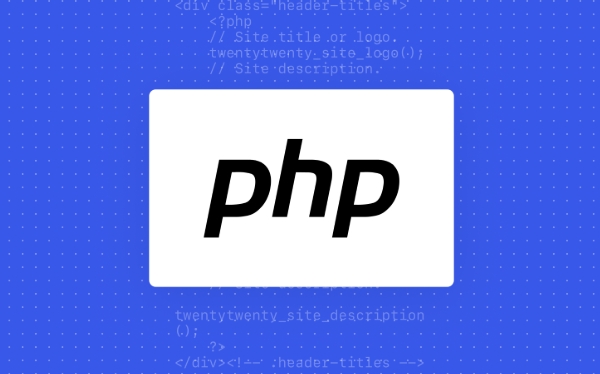Dependency Injection: The Superior Alternative to $GLOBALS
Aug 03, 2025 pm 03:56 PMDependency injection (DI) is superior to using $GLOBALS because it makes dependencies explicit, whereas $GLOBALS hides them. 2. DI improves testability by allowing easy mocking of dependencies, unlike $GLOBALS which requires manipulating global state. 3. DI reduces tight coupling by decoupling components from global scope, while $GLOBALS creates unpredictable side effects and namespace pollution. 4. DI supports Inversion of Control (IoC) through containers used in modern frameworks like Laravel and Symfony, enabling scalable and maintainable architectures. 5. Transitioning from $GLOBALS to DI can be done incrementally by refactoring functions to accept dependencies as parameters and adopting constructor injection in new classes. 6. Constructor injection is the preferred DI pattern as it ensures required dependencies are provided at instantiation. Ultimately, DI leads to cleaner, more modular, and professional code, making it the best practice for any serious PHP application beyond simple scripts.

Using dependency injection instead of relying on $GLOBALS is a more maintainable, testable, and scalable approach in modern PHP development. While $GLOBALS offers global access to variables across scopes, it introduces tight coupling, makes code harder to debug, and undermines predictability. Dependency injection (DI) solves these issues by explicitly providing dependencies to components that need them.

Why $GLOBALS Falls Short
$GLOBALS is a superglobal array in PHP that contains references to all variables defined in the global scope. While convenient, it encourages poor practices:
- Hidden dependencies: When a function pulls data from $GLOBALS, it's not obvious what it depends on just by looking at its signature.
- Hard to test: You can't easily mock or isolate behavior in unit tests because the function relies on external global state.
- Namespace pollution: Any part of the code can modify $GLOBALS, leading to unexpected side effects and bugs that are difficult to trace.
- Tight coupling: Components become dependent on global state rather than receiving what they need through clear interfaces.
For example:

function processOrder() {
$db = $GLOBALS['database'];
$db->query("...");
}This function has no declared dependency on a database—it just assumes one exists in $GLOBALS. That makes it fragile and unclear.
How Dependency Injection Improves Code Quality
Dependency injection means passing dependencies (like services, configurations, or objects) into a class or function from the outside, rather than letting it fetch them internally.

1. Explicit Dependencies
With DI, dependencies are clear from the function or constructor signature:
class OrderProcessor {
private $database;
public function __construct($database) {
$this->database = $database;
}
public function process() {
$this->database->query("...");
}
}Now it’s immediately obvious that OrderProcessor needs a database to work.
2. Better Testing
You can easily inject a mock database during testing:
$mockDb = $this->createMock(Database::class);
$mockDb->method('query')->willReturn(true);
$processor = new OrderProcessor($mockDb);
$result = $processor->process();No need to set up global state or worry about side effects.
3. Looser Coupling and Reusability
Classes aren’t tied to global variables or specific implementations. You can swap out the database, logger, or config manager without changing internal logic.
4. Support for Inversion of Control (IoC)
DI works well with IoC containers, which manage object creation and dependency resolution automatically. Frameworks like Laravel, Symfony, and Slim use DI containers extensively to streamline application architecture.
Example using a simple container:
$container = new Container();
$container->set('Database', function() {
return new Database($host, $user, $pass);
});
$container->set('OrderProcessor', function($c) {
return new OrderProcessor($c->get('Database'));
});This keeps object creation centralized and configurable.
Common DI Patterns
There are three main ways to inject dependencies:
- Constructor injection: Pass dependencies via the constructor (most common and recommended).
- Setter injection: Use setter methods to inject optional or replaceable dependencies.
- Interface injection: Less common in PHP; involves implementing an interface that defines how dependencies are injected.
Constructor injection is preferred because it ensures required dependencies are present from the start.
Transitioning from $GLOBALS to DI
Moving away from $GLOBALS doesn’t have to happen all at once. Start small:
- Identify functions that use $GLOBALS.
- Refactor them to accept parameters instead.
- Use dependency injection in new classes from the beginning.
- Gradually introduce a DI container for managing complex object graphs.
For instance, replace this:
function sendEmail($to, $subject) {
$mailer = $GLOBALS['mailer'];
$mailer->send($to, $subject);
}With:
function sendEmail($to, $subject, Mailer $mailer) {
$mailer->send($to, $subject);
}Or better yet, encapsulate in a class with constructor injection.
Bottom Line
Dependency injection promotes cleaner, more modular, and testable code. While $GLOBALS might seem like a quick way to share data, it leads to technical debt and fragile applications. DI requires a bit more upfront effort but pays off in long-term maintainability and flexibility.
It’s not just a trend—it’s a foundational practice in professional PHP development. Once you start using DI consistently, going back to global variables feels like stepping into the past.
Basically, if you're building anything beyond a simple script, DI is the way to go.
The above is the detailed content of Dependency Injection: The Superior Alternative to $GLOBALS. For more information, please follow other related articles on the PHP Chinese website!

Hot AI Tools

Undress AI Tool
Undress images for free

Undresser.AI Undress
AI-powered app for creating realistic nude photos

AI Clothes Remover
Online AI tool for removing clothes from photos.

Clothoff.io
AI clothes remover

Video Face Swap
Swap faces in any video effortlessly with our completely free AI face swap tool!

Hot Article

Hot Tools

Notepad++7.3.1
Easy-to-use and free code editor

SublimeText3 Chinese version
Chinese version, very easy to use

Zend Studio 13.0.1
Powerful PHP integrated development environment

Dreamweaver CS6
Visual web development tools

SublimeText3 Mac version
God-level code editing software (SublimeText3)
 Dependency Injection: The Superior Alternative to $GLOBALS
Aug 03, 2025 pm 03:56 PM
Dependency Injection: The Superior Alternative to $GLOBALS
Aug 03, 2025 pm 03:56 PM
Dependencyinjection(DI)issuperiortousing$GLOBALSbecauseitmakesdependenciesexplicit,whereas$GLOBALShidesthem.2.DIimprovestestabilitybyallowingeasymockingofdependencies,unlike$GLOBALSwhichrequiresmanipulatingglobalstate.3.DIreducestightcouplingbydecoup
 The Security Risks of Unchecked Global State via $GLOBALS
Aug 03, 2025 pm 04:20 PM
The Security Risks of Unchecked Global State via $GLOBALS
Aug 03, 2025 pm 04:20 PM
Uncheckeduseof$GLOBALSallowsunintendedvariableoverwriting,enablingattackerstomanipulatecriticaldatalikeuserIDsorroleswithoutvalidation;2.Itincreasestheattacksurfacebybreakingencapsulation,makingfunctionsdependentonmutableglobalstatethatcanbeexploited
 The Perils of Global State: Why You Should Avoid PHP's $GLOBALS
Aug 03, 2025 am 04:14 AM
The Perils of Global State: Why You Should Avoid PHP's $GLOBALS
Aug 03, 2025 am 04:14 AM
Using$GLOBALScreateshiddendependencies,makingfunctionshardertotest,fragile,andunreusable;2.Itcomplicatesunittestingbyrequiringglobalstatemanipulation,leadingtoslow,fragiletests;3.Globalstateisunpredictableduetouncontrolledmodifications,causingbugsand
 Refactoring Legacy PHP: A Practical Guide to Eliminating $GLOBALS
Aug 03, 2025 am 11:14 AM
Refactoring Legacy PHP: A Practical Guide to Eliminating $GLOBALS
Aug 03, 2025 am 11:14 AM
To eliminate $GLOBALS in PHP, it should first analyze its usage and then replace global variables with dependency injection, configuring objects, and step-by-step refactoring. 1. Use grep and other tools to find out all the usage of $GLOBALS and record the key names and locations; 2. Replace global variables such as database connections and configurations with explicit dependencies, such as injecting PDO or Config objects through constructors; 3. Create service classes (such as Logger, UserService) to encapsulate functions to avoid function dependence on global state; 4. Centrally manage the configuration, load from the configuration file returning the array, and inject the required classes; 5. Reconstruct the database in a small way, replacing a $GLOBALS reference at a time, and test to ensure consistent behavior; 6. Beware of including
 Analyzing the Performance Overhead of the $GLOBALS Superglobal
Aug 03, 2025 am 09:16 AM
Analyzing the Performance Overhead of the $GLOBALS Superglobal
Aug 03, 2025 am 09:16 AM
Theperformanceoverheadof$GLOBALSisminimalinmostcasesbutcanbecomesignificantinhigh-frequencyfunctionsorlong-runningscripts;1.$GLOBALScreatessymboltableandmemoryoverheadbymirroringallglobalvariables;2.Arrayaccessvia$GLOBALS['var']isslowerthandirectvari
 Debugging Global State Chaos Caused by $GLOBALS Manipulation
Aug 03, 2025 pm 01:46 PM
Debugging Global State Chaos Caused by $GLOBALS Manipulation
Aug 03, 2025 pm 01:46 PM
$GLOBALSmanipulationcancauseunpredictablebugsinPHP;todebugandresolveit,1.Understandthat$GLOBALSprovidesglobalaccesstoallvariables,makingstatechangeshardtotrack;2.DetectunwantedmodificationsusingstrategicdebugloggingandaGlobalsWatcherclasstosnapshotan
 Navigating the Minefield: Legitimate (and Rare) Use Cases for $GLOBALS
Aug 04, 2025 pm 02:10 PM
Navigating the Minefield: Legitimate (and Rare) Use Cases for $GLOBALS
Aug 04, 2025 pm 02:10 PM
Using$GLOBALSmaybeacceptableinlegacysystemslikeWordPresspluginswhereitensurescompatibility,2.Itcanbeusedtemporarilyduringbootstrappingbeforedependencyinjectionisavailable,3.Itissuitableforread-onlydebuggingtoolsindevelopmentenvironments.Despitethesec
 $GLOBALS: A Historical Relic or a Misunderstood Tool?
Aug 03, 2025 pm 02:31 PM
$GLOBALS: A Historical Relic or a Misunderstood Tool?
Aug 03, 2025 pm 02:31 PM
$GLOBALSisnotinherentlybad;itisatoolwhosevaluedependsonitsuse.Itisanassociativearrayprovidingaccesstoallglobalvariables,allowingfunctionstoreadglobalvariableswithouttheglobalkeyword.Itsnegativereputationstemsfromencouragingglobalstate,obscuringdepend






